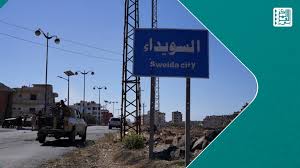In light of the recent and severe escalation in Suweida Governorate—and the increasing violence and growing unrest—there is a pressing need for a realistic and comprehensive approach. Such an approach must be rooted in the principles of Syrian national reconciliation, socially and politically, and lay the groundwork for a just and balanced political solution.
The events witnessed in the governorate mark a turning point that signals serious risks—not only in southern Syria but across the entire Syrian landscape—amid fears of slipping into civil conflict. These fears are compounded by deep regional and international polarization and external interventions that exploit Syria’s internal crisis to advance divisive and destabilizing agendas aimed at fragmenting the state and society alike.
Reducing what occurred in Suweida to isolated security incidents or individual confrontations with the state is a grave misjudgment that may undermine prospects for resolution. The crisis is far more profound; it reflects a systemic failure in addressing political and societal challenges and results from long-standing policies of marginalization, exclusion, and impunity.
Motivated by our ethical, political, and national responsibilities, this paper seeks to identify root causes and guiding principles. It aims to serve as a preliminary step toward serious resolution—or at minimum, to spark a broader political, civil, and societal dialogue focused on preserving Syria’s unity, sovereignty, and independence, and ensuring the safety and dignity of its citizens.
- Diagnosing Responsibilities and Root Causes
- The central political authority in Damascus bears primary responsibility for the outbreak of the crisis in Suweida, driven by multiple interrelated factors, including:
- A failure to understand Syria’s societal diversity, the absence of a strategic and inclusive vision, and a preference for security-centric approaches over political dialogue and participation.
- Marginalization of meaningful engagement, which has entrenched societal divisions and opened the door to foreign intervention, weakening state sovereignty and fragmenting the national fabric.
- State media has played a counterproductive role, failing to provide a unifying national narrative and allowing space for divisive and polarizing rhetoric.
- Erosion of trust between citizens and the state due to a lack of accountability, especially concerning unchecked abuses and violations—particularly in coastal regions—further undermining the state’s legitimacy.
- Security practices in Suweida, including arbitrary arrests and the involvement of unaffiliated armed groups, have exacerbated feelings of exclusion and driven segments of society toward sectarian or tribal identities as a means of protection.
- The rise of separatist tendencies has been fueled by external interventions that aim to institutionalize division and capitalize on internal failures and local grievances.
- National Principles for a Credible Solution
- Suweida is an integral part of the Syrian Arab Republic. Any form of separation or self-governance outside the constitutional framework is unacceptable.
- All forms of foreign interference in Syrian affairs must be condemned—including repeated Israeli attacks on Syrian sovereignty.
- Accountability and justice are essential foundations for reconciliation. All perpetrators of crimes and violations in Suweida—regardless of affiliation—must be held accountable.
III. Practical Steps Toward Resolution
- Establish an Independent National Reconciliation Committee composed of credible and impartial figures trusted by the local community. This committee would lead efforts to de-escalate tensions, facilitate dialogue, and rebuild trust between the people and the state.
- Form an Independent Investigative Committee under UN Oversight staffed by legal and human rights experts. It should investigate crimes committed against civilians, local leaders, and military personnel in Suweida and publish transparent findings.
- Activate Local Administration Law No. 107 (2011) by holding genuine local elections to establish representative councils and strengthen decentralized governance in line with national unity.
- Expand Representation in the People’s Assembly through electoral reform to ensure inclusive participation from all regions and communities and to strengthen the legislative branch’s role during the transitional period.
- Establish Foundations for Transitional Justice through a national body that integrates legal, technical, and community perspectives. It should ensure victim-centered justice, meaningful compensation, and a unified national narrative on post-2011 violations.
- Reform the Military Institution by creating a unified national army committed to the constitution and people, integrating recruits from all communities and regions, and eliminating sectarianism in doctrine and structure.=
- Implementation Mechanism and Sustainability Guarantees
The roadmap proposes a phased implementation plan with a defined timeline:
- Phase One (3–6 months): Establish reconciliation and investigation committees; ensure civilian protection.
- Phase Two (6–12 months): Launch national dialogue; prepare for local elections; reactivate civilian institutions.
- Phase Three (12–24 months): Complete transitional justice processes; restructure state institutions, including the military; engage in constitutional reforms.
Implementation must be accompanied by neutral oversight—regional or international—and active monitoring by civil society organizations to ensure transparency and compliance.
What is unfolding in Suweida cannot be viewed in isolation from the broader Syrian crisis. This is a pivotal test of justice, recovery, and the rebuilding of a modern state grounded in law, participation, citizenship, and dignity.
The path to resolution lies not in bargaining or evasion, but in dialogue, mutual recognition, and a return to reason.
Rather than consolidating a new de facto reality or external imposition, this roadmap seeks to create a historic opportunity to build a united, sovereign, democratic, and just Syria for all its citizens.
This article was translated and edited by The Syrian Observer. The Syrian Observer has not verified the content of this story. Responsibility for the information and views set out in this article lies entirely with the author.


